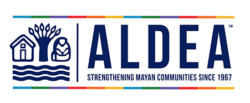
Located in the northern part of Tecpán, Palamá is a relatively large community with a population of 1,752 people. It was founded in 1908 and is located 11 miles from the municipal seat. The name “Palamá” means “hilamo tree place,” after a type of tree that is common in the Chimaltenango area. About 70 percent of the families living there are Catholics, 20 percent are Evangelicals, and the rest profess the Mayan religion.
Agriculture is the main productive activity in Palamá, where they grow corn, beans, apples, peaches, avocados, broccoli, potatoes, and carrots. Men in the community used to work at large farms for about $7 per day. Palamá has a health post offering basic medical services and vaccines, as well as a community school attended by 467 children at the pre-school and primary levels. Electric service reaches 80 percent of households; the remaining 20 percent have to use candles. The community’s roads are mainly dirt, with only 10 percent being paved, but they are passable all year.
Our Partnership:
Palamá has rarely received support from the government or other agencies for development initiatives. ALDEA and ABPD began working with 92 Palamá families in August 2018 that completed our integrated program in May 2020. Click here to learn more about how we work with our partner communities and visit our blog to stay up to date with the latest developments on the ground in Guatemala!
